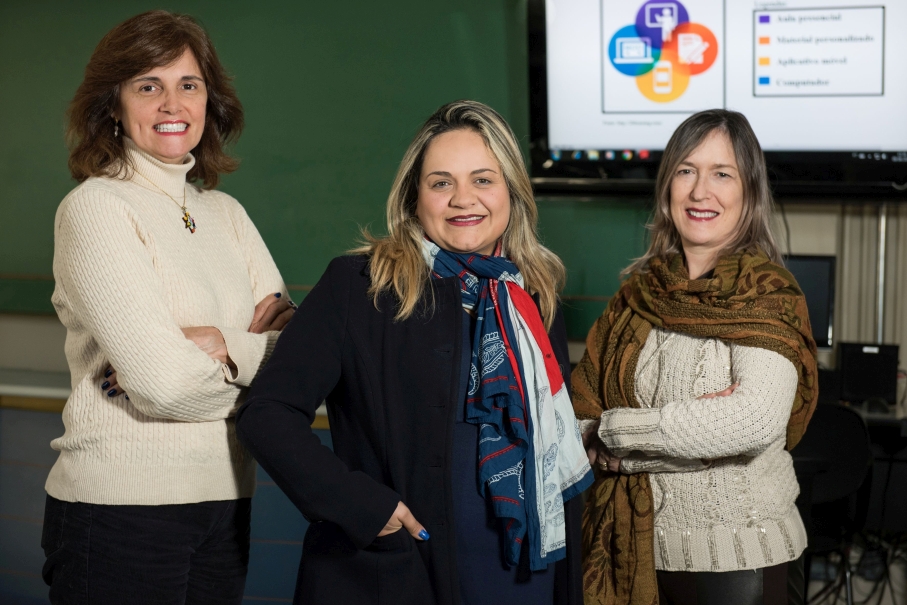Doctoral research combines interdisciplinarity, innovation and internationalization
Por: PUCRS Magazine

Medicine and Language Arts together: Bartira (D), doctoral student Débora and Heloísa. Photo: Bruno Todeschini – Ascom/PUCRS
Doctoral research conducted in support of the Graduate Program in Medicine combines three important pillars of the University: internationalization, innovation and interdisciplinarity. The study, a partnership between the School of Medicine and the Language and Literature program, is intended for the improvement of the oral skills of the English language of PhD medical students relying on an app for full-time extra-class learning as an educational support.
The Graduate Program in Medicine has been awarded grade 7 by Capes, and internationalization has played a major role in this level of excellence. In this scenario, medical students must be prepared for scientifically correct and linguistically appropriate communication when attending congresses or meetings overseas. “We want to produce researchers who are able to establish partnerships with national and international peers in order to find collaborators and collect funding for research. In this sense, being able to speak fluently and adequately, as a starting point for internationalization, has become crucial for establishing this connection”, says Bartira Costa, the advisor.
Doctoral student Débora Montenegro Pasin has a degree in Language Arts and Literature – Portuguese and English from PUCRS, is a specialist in translation and has been teaching languages for 20 years. In view of her background, she has been invited by Professor Bartira to join this interdisciplinary journey, under the co- advising or Professor Heloísa Delgado, from the Language and Literature program.
Three volunteers, out of more than 70 doctoral students at Famed, will be recruited to take part in the study. “We have used B1 level of the Common European Framework of Reference as a linguistic reference, and we aim at making them reach level B2, which is required by most universities overseas”, says Débora.
New Course
The participants’ development will be compared to the other doctoral students’, which may have achieved a similar linguistic level through other means. “We don’t think this is the only way, but as an educational institution we must provide it in a systematic way, without expecting that students achieve this level solely through their own efforts. We want to make progress in terms of the speaking ability, which is the most critical one when you want to prepare people to have international influence”, says Bartira.
If this method proves to be efficient, the idea is to offer a cross-sectional course for students in the Graduate Program in Medicine. Therefore, the course will address topics in technical and scientific academic English, focusing on speaking. Thus, graduate students from any program in the University could join. “The idea is to replicate the study to serve as a model for other researchers”, ponders Heloísa.
To find out more about it, please visit PUCRS Magazine 2016 annual issue.